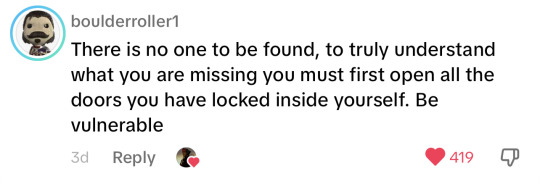Text
hello all!! i felt the urge to start over fresh so i made a new blog @cherrygummybears . this blog isn’t going anywhere, i’m not going to delete it or anything, ill probably still use it sometimes but i can’t guarantee how active i will be on here and ill definitely be more active on my new blog. so if you saw a new person following you under cherrygummybears, that was me! i hope to see all of you there as well :) much love <3
#from my main#similarly i can’t guarantee how active ill be on this side log#prob not much given that i’m already not that active to start#but it’s staying up so no worries
5 notes
·
View notes
Text
Having a traumatic childhood means you cannot talk even objectively about your basic foundational experiences without it being "venting", even if you're not actually venting. You just straight up have a huge chunk of your life you can't talk about, full stop, without it being trauma dumping.
And it not being socially acceptable to talk about your own childhood is super alienating. Sometimes people want to know why, and any answer you can give them is going to be off putting.
It's to the point I get irritated when something I said is framed as venting when I'm literally just talking about my life experiences, doing my best to keep emotion out of it.
105K notes
·
View notes
Text


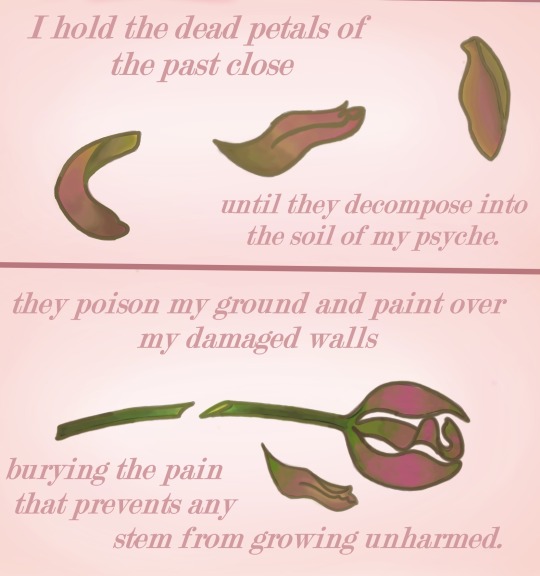
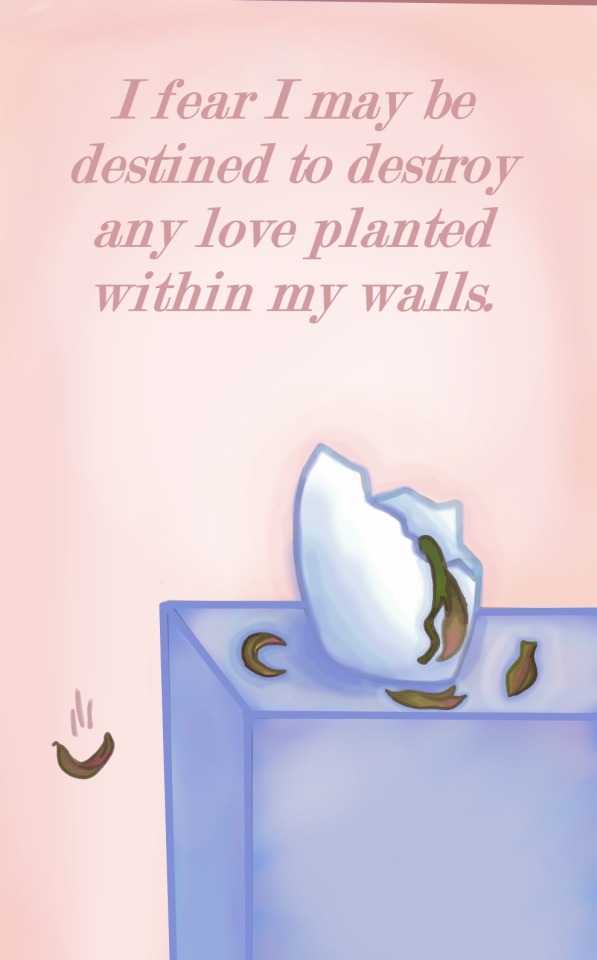



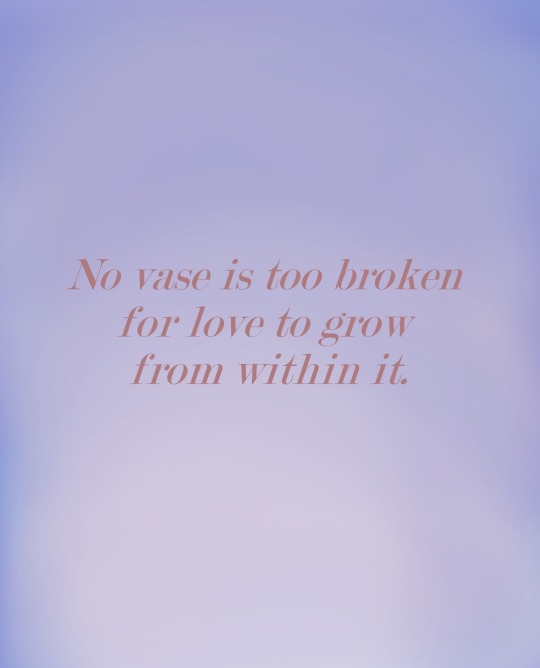
finally posting this comic i made ages ago back in summer/fall 2022, about self sabotage… my composition was really messy because i didn’t know how to do digital art (i still don’t ngl lmao) but bc of the message behind it its still very dear to my heart :,) words are also by me <3
7 notes
·
View notes
Text
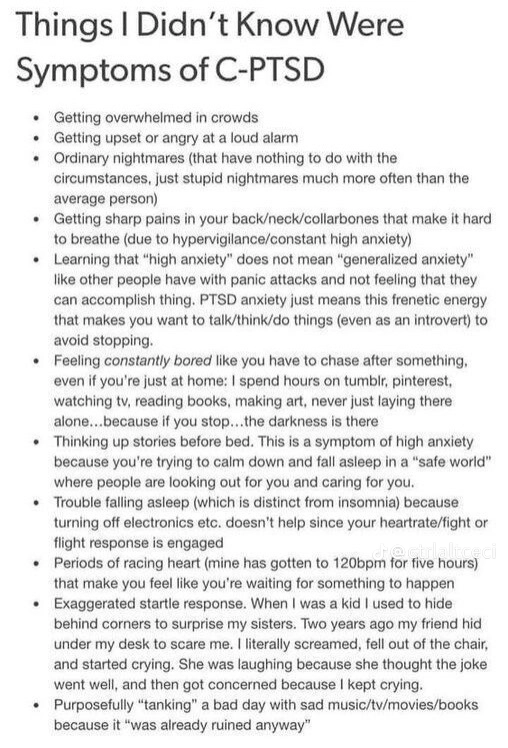
being like this and living with someone who doesn't understand is so hard.
2K notes
·
View notes
Text
Don’t forget to be proud of you. Remember all those times you silently struggled, or picked yourself up off the bathroom floor from crying. All the times you resisted harmful urges or things like that.
It’s easy to forget about these things, but you have done stuff like this time and time again and that’s admirable. You deserve to be proud of you. Give yourself credit for all your victories. Big or small.
919 notes
·
View notes
Text
Parts of PTSD that no one talks about
Not knowing who to be angry at.
Being angry with yourself for letting it happen even if there was no way to stop it.
Crying and not knowing why.
Flashbacks where nothing bad is happening but it feels bad.
Denying that it ever even happened because your brain doesn't want to process it.
Wanting to go back to it so it feels "bad enough."
Intentionally triggering yourself to feel like your suffering is real.
Being angry all the time at every little thing.
Getting triggered by minor things and then being treated poorly because of your reaction to said trigger.
Hating change.
Being scared to sleep because you know you'll have nightmares.
Struggling to find hobbies that you enjoy.
Feeling like you're barely human.
Struggling to be positive about anything at all.
Feeling like you may be manipulating people around you into liking you.
Feeling like no one believes you because you barely even believe yourself.
Treating your past self as a "dead" version of you and feeling like a completely different person.
Being tired all the time, both physically and mentally.
Feeling like if you talk about it, your safety will be at risk.
Feeling the need to hide your trauma from everyone, including professionals there to help them.
Being paranoid everyone is going to hurt you.
Being physically incapable of talking about it.
Feeling like you're stuck reliving your trauma.
Having to skip classes or work days because of flashbacks.
Mourning your past self.
Wanting to hurt others so they feel what you feel.
Wondering why it had to be you and it wasn't someone else.
Chronic pain.
Clinging to "safe people."
Not being able to find a solid sense of identity.
Forcing yourself to be around people who trigger you for the sake of politeness.
1K notes
·
View notes
Text
Not many people talk about how deep emotional neglect hurts you.
I’m afraid to want things. I’m afraid to ask for help. I’m afraid to tell someone something if they seem in a bad mood. I can’t process when someone is nice to me. I can’t handle rejection, but my brain literally short circuits if someone gives me a compliment to the point where sometimes the rejection is better.
There are lots of overlap with emotional abuse, but emotional neglect hurts just as much. And it’s even worse that it usually goes undetected, so a lot of people can’t tell they’re being neglected until it’s too late.
42K notes
·
View notes
Text
because sometimes there are invisible tests and invisible rules and you're just supposed to ... know the rule. someone you thought of as a friend asks you for book recommendations, so you give her a list of like 30 books, each with a brief blurb and why you like it. later, you find out she screenshotted the list and send it out to a group chat with the note: what an absolute freak can you believe this. you saw the responses: emojis where people are rolling over laughing. too much and obsessive and actually kind of creepy in the comments. you thought you'd been doing the right thing. she'd asked, right? an invisible rule: this is what happens when you get too excited.
you aren't supposed to laugh at your own jokes, so you don't, but then you're too serious. you're not supposed to be too loud, but then people say you're too quiet. you aren't supposed to get passionate about things, but then you're shy, boring. you aren't supposed to talk too much, but then people are mad when you're not good at replying.
you fold yourself into a prettier paper crane. since you never know what is "selfish" and what is "charity," you give yourself over, fully. you'd rather be empty and over-generous - you'd rather eat your own boundaries than have even one person believe that you're mean. since you don't know what the thing is that will make them hate you, you simply scrub yourself clean of any form of roughness. if you are perfect and smiling and funny, they can love you. if you are always there for them and never admit what's happening and never mention your past and never make them uncomfortable - you can make up for it. you can earn it.
don't fuck up. they're all testing you, always. they're tolerating you. whatever secret club happened, over a summer somewhere - during some activity you didn't get to attend - everyone else just... figured it out. like they got some kind of award or examination that allowed them to know how-to-be-normal. how to fit. and for the rest of your life, you've been playing catch-up. you've been trying to prove that - haha! you get it! that the joke they're telling, the people they are, the manual they got- yeah, you've totally read it.
if you can just divide yourself in two - the lovable one, and the one that is you - you can do this. you can walk the line. they can laugh and accept you. if you are always-balanced, never burdensome, a delight to have in class, champagne and glittering and never gawky or florescent or god-forbid cringe: you can get away with it.
you stare at your therapist, whom you can make jokes with, and who laughs at your jokes, because you are so fucking good at people-pleasing. you smile at her, and she asks you how you're doing, and you automatically say i'm good, thanks, how are you? while the answer swims somewhere in your little lizard brain:
how long have you been doing this now? mastering the art of your body and mind like you're piloting a puppet. has it worked? what do you mean that all you feel is... just exhausted. pick yourself up, the tightrope has no net. after all, you're cheating, somehow, but nobody seems to know you actually flunked the test. it's working!
aren't you happy yet?
46K notes
·
View notes
Text
tbh when i hear some people talk about 'breaking cycles of abuse', it becomes clear pretty quickly who has come to understand that phrase to mean 'since i was a victim of abuse/neglect by my parents/caretaker/s i will do everything to be nothing like them' and that is all. its not a completely flawed way of thinking either - something that hurt you would very likely hurt someone else; through empathy we learn to understand not to hurt others the way we were hurt too.
but what 'breaking cycles' looks like is more complicated than just not being your parents/caretakers - it's about recognizing how the things that happened to you changed you and how you can heal so you don't hurt someone else in turn. the survival skills you learned in an unhealthy enviroment often translate to poor if not unhealthy interpersonal skills in an enviroment where things ARE safe.
its a difficult pill to swallow for a lot of survivors of abuse (trust me, i know) because we have a tendency to simply want our pain to be recognized. by painting yourself as "absolutely nothing like my abuser" you can abstain from recognizing your own harmful tendencies and live comfortably in the role of victim hood for the rest of your life. it can be tempting to do this especially when so many people will do their best to deny what you experienced - almost like leaning into a stuck door that just won't budge.
the problem with this is if you never recognize that being mistreated made it so you LACK a lot of what other people learned from a loving enviroment, you can hurt people pretty badly even when doing your best just not to replicate what your parents/caretakers got wrong.
this also hurts for victims because, when it comes down to it - it's not FAIR. you were hurt for no reason, and most of us will never hear an apology or even admittance from the person who did it - so why do YOU have to change? why do YOU, the person hurt unjustly, have to put in the work?
and i mean. that's what breaking a cycle is. it means pushing against what's fair and comfortable deliberately so that you can stop something that's been repeating. it's work. its not just recognition of pain, it's the purposeful healing and treatment of it. but thats scary, and it's not fun, so a lot of people fall right back into it. its a lot easier said than done.
19K notes
·
View notes
Text
“It is crucial for deeper level recovery that we learn that feelings of fear, shame and guilt are sometimes signs that we have said or done the right thing. They are emotional flashbacks to how we were traumatized for trying to claim normal human privileges.”
— Complex PTSD: From Surviving to Thriving, Pete walker, pg 78
(via thetwistedrope)
#oh god#yeah#me when i’m terrified every time i say what i want or enforce a boundary or ask someone to do something or take up space or
2K notes
·
View notes
Text
CPTSD, the feeling of:
Being 3+ ages at once.
Laughing along when people make fun of your hypervigilance because what has your mortal terror ever been but a joke.
Always wondering what you could have been like if-
Missing entire years from your memories. And here’s the catch: not remembering the abuse doesn’t anesthetize the pain of experiencing it, it just makes you question whether you have the right to feel so fucked up all the time.
Emotional-object permanence? the fuck even is that.
Taking care of yourself? Dangerous. Knowing what you want and asking for it? Dangerous. Acting hurt when you’ve been hurt? Dangerous. Saying No? god it’s like you want to be punished.
Can’t tell whether you want something because you like it, or if you want it because they do.
Can’t tell the difference between who you are and who they trained you to be.
The cruelty of nostalgia.
Existing at the intersection of vulnerability and rage (the apt comparison being a cornered animal, aware of its back against the wall.)
There’s love, and there’s abuse, and you’ve been told most people can tell the difference between the two, but not you, never you - you’ve never known one without the other.
Not connecting with your body right, not understanding it as your own.
No matter what you do, never being able to fully shed the skin of powerlessness.
No matter how far you go, never being able to find your way out of the minefield of your childhood.
9K notes
·
View notes
Text
Not many people talk about how deep emotional neglect hurts you.
I’m afraid to want things. I’m afraid to ask for help. I’m afraid to tell someone something if they seem in a bad mood. I can’t process when someone is nice to me. I can’t handle rejection, but my brain literally short circuits if someone gives me a compliment to the point where sometimes the rejection is better.
There are lots of overlap with emotional abuse, but emotional neglect hurts just as much. And it’s even worse that it usually goes undetected, so a lot of people can’t tell they’re being neglected until it’s too late.
42K notes
·
View notes
Text
it's alright to find it difficult to be kind to yourself. it is difficult. especially if you've spent most of your life treating yourself differently.
but the fact that you're trying at all is so great. you can't expect to change the way you think about yourself overnight but each time you practice self compassion or stop yourself thinking something unkind about yourself you are getting some step closer to where you are trying to be.
2K notes
·
View notes
Text
tbh when i hear some people talk about 'breaking cycles of abuse', it becomes clear pretty quickly who has come to understand that phrase to mean 'since i was a victim of abuse/neglect by my parents/caretaker/s i will do everything to be nothing like them' and that is all. its not a completely flawed way of thinking either - something that hurt you would very likely hurt someone else; through empathy we learn to understand not to hurt others the way we were hurt too.
but what 'breaking cycles' looks like is more complicated than just not being your parents/caretakers - it's about recognizing how the things that happened to you changed you and how you can heal so you don't hurt someone else in turn. the survival skills you learned in an unhealthy enviroment often translate to poor if not unhealthy interpersonal skills in an enviroment where things ARE safe.
its a difficult pill to swallow for a lot of survivors of abuse (trust me, i know) because we have a tendency to simply want our pain to be recognized. by painting yourself as "absolutely nothing like my abuser" you can abstain from recognizing your own harmful tendencies and live comfortably in the role of victim hood for the rest of your life. it can be tempting to do this especially when so many people will do their best to deny what you experienced - almost like leaning into a stuck door that just won't budge.
the problem with this is if you never recognize that being mistreated made it so you LACK a lot of what other people learned from a loving enviroment, you can hurt people pretty badly even when doing your best just not to replicate what your parents/caretakers got wrong.
this also hurts for victims because, when it comes down to it - it's not FAIR. you were hurt for no reason, and most of us will never hear an apology or even admittance from the person who did it - so why do YOU have to change? why do YOU, the person hurt unjustly, have to put in the work?
and i mean. that's what breaking a cycle is. it means pushing against what's fair and comfortable deliberately so that you can stop something that's been repeating. it's work. its not just recognition of pain, it's the purposeful healing and treatment of it. but thats scary, and it's not fun, so a lot of people fall right back into it. its a lot easier said than done.
19K notes
·
View notes
Text
on the days when your trauma is louder than your love, remember you are more than what has hurt you
3K notes
·
View notes
